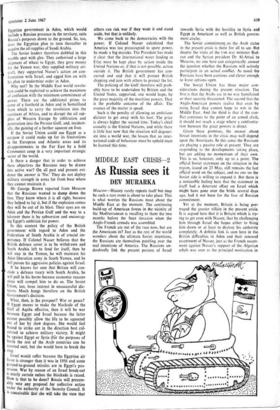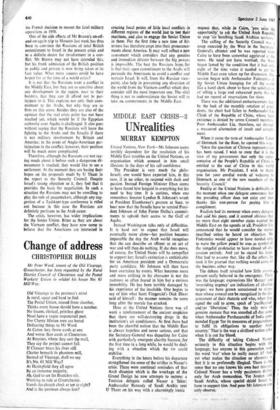As Russia sees it
MIDDLE EAST CRISIS-2 DEV MURARKA
Moscow—History rarely repeats itself but may be such a rare event is about to take place. This is what worries the Russians most about the Middle •East at the moment. The continuing build-up of American forces in the vicinity of the Mediterranean is recalling to them the two months before the Suez invasion when the Anglo-French armada was assembled.
The French are dut of the race now, but are the Americans in? Just as the rest of the world wonders about the ultimate Soviet intentions, the Russians are themselves puzzling over the real intentions of America. The Russians un- doubtedly link the present posture of Israel
towards Syria with the hostility to Syria and Egypt in American as well as British govern- ment circles.
The Soviet commitment to the Arab states in the present crisis is there for all to see. But despite the visits of the VAR war minister Bad- ran and the Syrian president Dr Al-Attasi to Moscow, no one here can categorically answer the question whether the Russians will actively participate in an actual conflict. As usual the Russians have been cautious and clever enough to leave options open.
The Soviet Union has three major con- siderations during the present situation. The first is that the Arabs are in no way humiliated or their security threatened. The second that the Anglo-American powers realise that even by using Israel they cannot hope to win in the Middle East. And the third is that if the con- flict continues to the point of an armed clash, it should not reach a stage where a confronta- tion between the great powers is direct.
Given these premises, the answer about Soviet intentions in the crisis may well depend upon the Americans. In this sense the Russians are playing a passive role at present. They are responding to the developments taking place, but are adding no momentum of their own. This is so, however, only up to a point. The official Soviet statement on the situation in the region, issued on 23 May, still remains the last official word on the subject, and no one on the Soviet side is willing to expand it. But there is a noticeable feeling here that the statement in itself had a deterrent effect on Israel which might have gone over the brink several days ago, had it not been for the fear of Russian commitment.
Yet at the moment, Britain is being por- trayed the greater villain in the present crisis. It is argued here that it is Britain which is try- ing to get even with Nasser, that by challenging him through Israel she hopes either to bring him down or at least to destroy his authority completely. A definite link is seen here in the British difficulties in Aden and their renewed resentment of Nasser, just as the French resent- ment against Nasser's support of the Algerian rebels was seen as the principal motivation in the French decision to mount the fatal military operations in 1956.
One of the side effects. of Mr Brown's on-off- and-on-again trip to Moscow last week. has thus been to convince the Russians of total British commitment to Israel in the present crisis and to a definite desire for involvement in a con- flict, Mr Brown may not have intended this, but his frank admission of the British position in public and private is now being taken at its face value. What more success could he have hoped for at the time of a world crisis?
It is not that the Russians want a conflict in the Middle East, but they are so sensitive about any development in the region, near to their borders, that they can ill afford not to par- ticipate in it. This explains not only their com- mitment to the Arabs, but why -they are so firm on this score. Besides they are also of the opinion that the real crisis point has not been reached yet, which would be if the Egyptian authority over Aqaba is challenged. It also goes without saying that the Russians will leave the fighting to the Arabs and the Israelis if there is not military involvement by Britain and America; in the event of Anglo-American par- ticipation in the conflict, however, their position will be much more complicated.
Therefore, although the Russians are not say- ing much about it before such a dangerous de- nouement is reached, they would like to see a settlement. At the moment they are basing their hopes on the proposals made by U Thant in the report to the Security Council. Despite Israel's strong objection to it, they feel that it provides the basis for negotiation. In such a situation the Russians may not be unwilling to play the role of peacemakers, although any sug- gestion of a Tashkent-type conference is reed out because in this case the Russians are definitely partisans to the Arab cause.
The crisis, however, has wider implications for the Soviet Union. Bitter as they are about the Vietnam conflict, they have now come to believe that the Americans are interested in creating focal points of little local conflicts in different regions of the world just to test their reactions, and also to engage the Soviet Union in them. For the first time a new tone of bit- terness has. therefore crept into, their pronounce- ments about America. It may well reflect a new assessment which considers that any genuine and immediate détente between the big powers is impossible. The best the Russians hoped for is that their open commitment to the Arabs will persuade the. Americans to avoid a conflict and restrain Israel. It will, from the Russian view- point, also help in preventing any diversion of the world from the Vietnam conflict which they consider still the most important one. The vital thing is not to underestimate the Soviet will to take on commitments in the Middle East.



































 Previous page
Previous page